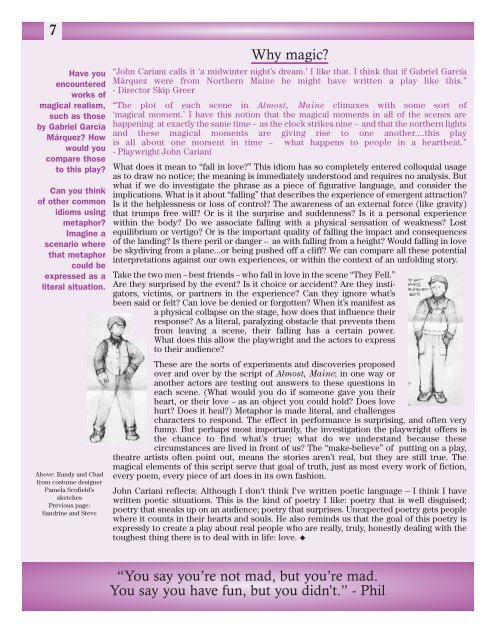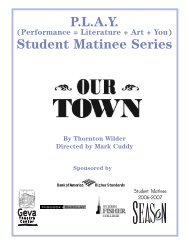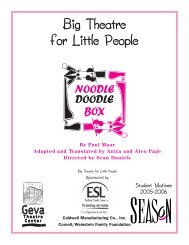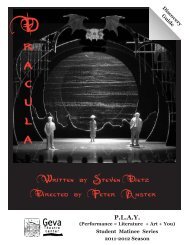P.L.A.Y. ALMOST, MAINE - Geva Theatre
P.L.A.Y. ALMOST, MAINE - Geva Theatre
P.L.A.Y. ALMOST, MAINE - Geva Theatre
You also want an ePaper? Increase the reach of your titles
YUMPU automatically turns print PDFs into web optimized ePapers that Google loves.
7<br />
Have you<br />
encountered<br />
works of<br />
magical realism,<br />
such as those<br />
by Gabriel García<br />
Márquez? How<br />
would you<br />
compare those<br />
to this play?<br />
Can you think<br />
of other common<br />
idioms using<br />
metaphor?<br />
Imagine a<br />
scenario where<br />
that metaphor<br />
could be<br />
expressed as a<br />
literal situation.<br />
Above: Randy and Chad<br />
from costume designer<br />
Pamela Scofield’s<br />
sketches<br />
Previous page:<br />
Sandrine and Steve<br />
Why magic?<br />
“John Cariani calls it ‘a midwinter night’s dream.’ I like that. I think that if Gabriel García<br />
Márquez were from Northern Maine he might have written a play like this.”<br />
- Director Skip Greer<br />
“The plot of each scene in Almost, Maine climaxes with some sort of<br />
‘magical moment.’ I have this notion that the magical moments in all of the scenes are<br />
happening at exactly the same time – as the clock strikes nine – and that the northern lights<br />
and these magical moments are giving rise to one another....this play<br />
is all about one moment in time – what happens to people in a heartbeat.”<br />
- Playwright John Cariani<br />
What does it mean to “fall in love?” This idiom has so completely entered colloquial usage<br />
as to draw no notice; the meaning is immediately understood and requires no analysis. But<br />
what if we do investigate the phrase as a piece of figurative language, and consider the<br />
implications. What is it about “falling” that describes the experience of emergent attraction?<br />
Is it the helplessness or loss of control? The awareness of an external force (like gravity)<br />
that trumps free will? Or is it the surprise and suddenness? Is it a personal experience<br />
within the body? Do we associate falling with a physical sensation of weakness? Lost<br />
equilibrium or vertigo? Or is the important quality of falling the impact and consequences<br />
of the landing? Is there peril or danger – as with falling from a height? Would falling in love<br />
be skydiving from a plane...or being pushed off a cliff? We can compare all these potential<br />
interpretations against our own experiences, or within the context of an unfolding story.<br />
Take the two men – best friends – who fall in love in the scene “They Fell.”<br />
Are they surprised by the event? Is it choice or accident? Are they instigators,<br />
victims, or partners in the experience? Can they ignore what’s<br />
been said or felt? Can love be denied or forgotten? When it’s manifest as<br />
a physical collapse on the stage, how does that influence their<br />
response? As a literal, paralyzing obstacle that prevents them<br />
from leaving a scene, their falling has a certain power.<br />
What does this allow the playwright and the actors to express<br />
to their audience?<br />
These are the sorts of experiments and discoveries proposed<br />
over and over by the script of Almost, Maine; in one way or<br />
another actors are testing out answers to these questions in<br />
each scene. (What would you do if someone gave you their<br />
heart, or their love – as an object you could hold? Does love<br />
hurt? Does it heal?) Metaphor is made literal, and challenges<br />
characters to respond. The effect in performance is surprising, and often very<br />
funny. But perhaps most importantly, the investigation the playwright offers is<br />
the chance to find what’s true; what do we understand because these<br />
circumstances are lived in front of us? The “make-believe” of putting on a play,<br />
theatre artists often point out, means the stories aren’t real, but they are still true. The<br />
magical elements of this script serve that goal of truth, just as most every work of fiction,<br />
every poem, every piece of art does in its own fashion.<br />
John Cariani reflects: Although I don't think I've written poetic language – I think I have<br />
written poetic situations. This is the kind of poetry I like: poetry that is well disguised;<br />
poetry that sneaks up on an audience; poetry that surprises. Unexpected poetry gets people<br />
where it counts in their hearts and souls. He also reminds us that the goal of this poetry is<br />
expressly to create a play about real people who are really, truly, honestly dealing with the<br />
toughest thing there is to deal with in life: love. <br />
“You say you’re not mad, but you’re mad.<br />
You say you have fun, but you didn’t.” - Phil





